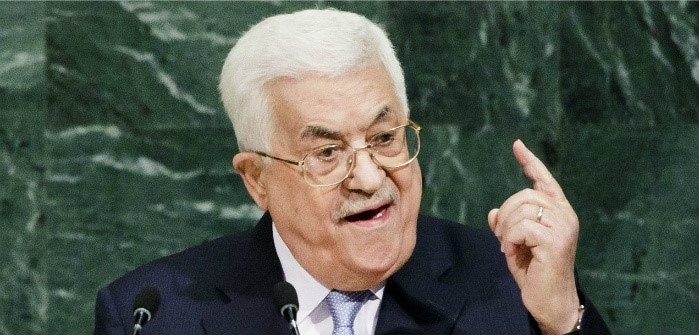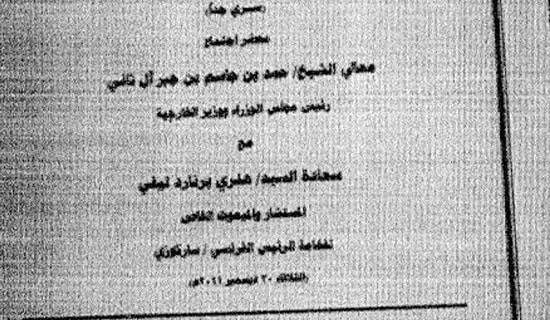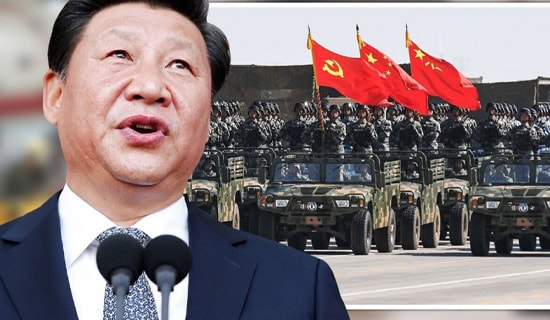In an English article published November 2, 2017 in The Cairo Review of Global Affairs,[1] Palestinian Authority President Mahmoud 'Abbas set out the PLO's credo and vision for peace, and called on Britain to apologize for the issuance of the Balfour Declaration. He said that this declaration, anchored in "white supremacist" views, "disregarded the wishes, aspirations, and the very rights of the indigenous population of Palestine" and ultimately led to the catastrophe and exodus of the Palestinian people in 1948. He also stated that, after supporting the Zionist movement in establishing a Jewish homeland in Palestine, Britain and the international community failed to implement the UN Resolution 181 (the Partition Plan of 1947), and later also "failed to implement Resolution 194 (III) to restore Palestine refugees to their homes." Stressing that any final settlement of the Arab-Israeli conflict must include the realization of Resolution 194 and the Arab Peace Initiative, namely "a just solution for the seven million Palestinian refugees based on the choice of every refugee," he urged Britain and the international community to make amends for the Balfour declaration by "recognizing the State of Palestine on the 1967 border with East Jerusalem as its capital," and by taking steps to realize the political rights of the Palestinian people, the very rights that were denied by Balfour a century ago."
The following is the article:[2]

PA President Mahmoud 'Abbas (image: thecairoreview.com, Nov 2, 2017)
"This year, our nation marks one hundred years of the Balfour Declaration. Lord Arthur Balfour was a British foreign secretary who decided to change the identity and fate of
"To this day, the
"Disgracefully, the text of the Balfour Declaration referred to the vast majority of the population as the 'non-Jewish communities,' in a deliberate attempt at setting the foundation and basis of denying them any future political rights. Balfour was fully entrenched in colonial ideology with no respect for the deeply-rooted presence of Palestinians, Christians, and Muslims. In 1922, he wrote: 'Zionism, be it right or wrong, good or bad, is rooted in age-long traditions, in present needs and future hopes of far profounder import than the desires and prejudices of 700,000 Arabs who now inhabit that ancient land.' It was a glaring dismissal of the presence, history, and rights of the population that had inhabited the land for centuries. Examined against the backdrop of the current debates in international politics, Balfour could have easily been referred to as a 'white supremacist.'
"The Balfour Declaration of 1917 symbolizes the international role in the Palestinian catastrophe and exodus, the Nakba of 1948. A century after this infamous declaration was drafted, it is long overdue for the international community to assume its legal, political, and moral responsibility to fulfill the inalienable rights of the Palestinian people. This prolonged injustice continues to test the credibility of our international system and to undermine the laws and human rights frameworks that are fundamental to its longevity and to peace and stability within and among nations.
"Balfour’s Bitter Legacy
"The Balfour Declaration, despite its great impact on our destiny as a nation, was never a matter of consensus among British politicians. The declaration continued with a British Mandate of Palestine that soon proved to be entrapped between Lord Balfour’s folly and the reality on the ground. In the following years, British colonial rule grappled with the contradictions of its promises to the Jewish and Arab peoples. Several British commissions wrote back to
"Balfour’s perfidy anticipated the international community’s disrespect for the rights of Palestinians after
"The world voted for the partition of
"The international community failed to fulfill the implementation of the UN Partition Resolution 181, a resolution that unquestionably did not allow or call for the forcible displacement of the Palestinian population. It also failed to implement Resolution 194 (III) to restore
SUPPORT OUR WORK

"From Balfour to 2017: One Hundred Years of Impunity
"The Israeli occupation that began in 1967—occupying the remaining 22 percent of Palestine, comprising the Gaza Strip and the West Bank, including East Jerusalem—initiated a systematic, multidimensional policy of colonization of occupied territory that has not ceased for over five decades, seriously impairing the prospects for a political solution. Even though the Palestine Liberation Organization (PLO), in a historic and painful compromise, recognized Israel in accordance with the relevant UN resolutions and declared the State of Palestine only over 22 percent of historic Palestine, Israel continues to deny the inalienable right of the Palestinian people to freedom and self-determination.
"The presence of illegal settlements all over the occupied territory of Palestine has threatened to make the two-state solution impossible to realize. This is clearly the goal of the current rightwing Israeli government that does not shy away from hiding such intentions. It has become widely acknowledged that Israel’s prolonged occupation and its colonial-settlement project has virtually destroyed the prospects of the internationally endorsed two-state solution on the 1967 borders, thereby solidifying the reality of one state, Israel, controlling all the land of historic Palestine, while imposing two different systems: one for Israeli-Jews and another for Palestinians.
"As far back as 1993, the PLO recognized Israel’s right to exist and agreed to participate in several rounds of negotiations in the Middle East peace process aimed at achieving a comprehensive peace agreement. After more than twenty years of negotiations, it is clear that the Israeli government is not interested in peace. For Palestine, the peace process is a means for the implementation of international law and realization of justice; the process is not an end in itself, but the Israeli government has constantly used it as such and exploited the 'negotiations' as a smokescreen for further colonization of the Palestinian land, including East Jerusalem, aimed at entrenching its control of the entire territory.
"The internationally endorsed two-state solution is not accepted by any of the political parties that compose today’s Israeli government coalitions. Their leaders continue to incite and spew hate speech against the Palestinian people and inflammatory rhetoric against Palestinian national rights and aspirations. This has included the dangerous use of religion to justify war crimes and human rights violations, which is something that we believe is of paramount gravity and consequence to regional and international peace and security, and have thus consistently warned against Israeli attempts to turn a solvable political, territorial conflict into a religious war.
"Just as Likud, the party of Israeli Prime Minister Benjamin Netanyahu, reaffirmed its political program that negates any possibility of the creation of a Palestinian state, on the ground Israeli settlers and occupation forces continue to act with hatred and aggression toward the Palestinian people, further diminishing the prospect of peaceful coexistence. Attacks continue against Palestinian civilians and properties, in Christian and Muslim holy sites, and homes continue to be demolished, forcibly displacing our people to pave the way for more colonial-settlement expansion.
"The one-state reality imposed by the Israeli government could not be possible without the impunity it has received from the international community. The Israeli colonial-settlement enterprise in Occupied Palestine could not succeed without international markets being opened to illegal Israeli settlement products, without free trade agreements welcoming these products, without international companies and the Israeli economy mutually profiting from this systematic denial of Palestinian rights, and without the commitments of several governments that no matter the violations and crimes, Israel will continue to enjoy full impunity.
"Make no mistake: Palestinians have learned the lessons from Balfour’s colonialism. We recently witnessed the steadfastness of the Palestinian people in Occupied East Jerusalem in the rejection of Israeli attempts to change the historic status quo of the Holy Al-Aqsa Mosque Compound. This beautiful demonstration of popular nonviolent resistance echoed in every corner of the world. Just as our youth and elders, women and men, Christians and Muslims, and members of all political factions came together to defend Jerusalem, we cannot but remember those who opposed British policies in the remarkable national strike of 1936, or the Israeli occupation in the First Intifada in 1987. Palestinians have showed the world and many Israelis that the colonial 'fantasy' of talking about peace and coexistence while systematically denying the rights of a people under an oppressive military occupation can never succeed and that the right of a people to self-determination and freedom can neither be crushed, nor dismissed, nor negated.
"Our Vision for a Just and Lasting Peace
"The steadfastness and resilience of our people should serve as a message to the entire world, and particularly to Israel, that there will be no peace in our region without the fulfillment of the inalienable rights of the Palestinian people. Our vision of peace is one of great compromise and is based simply on what we are entitled to under international law and UN resolutions: a sovereign and independent state that fully ends the Israeli occupation that began in 1967, with East Jerusalem as its capital, while ensuring at the same time that Jerusalem could be an open city between its eastern and western parts. We envision our sovereign control over our natural resources, airspace and maritime borders. We envision and will continue to demand the freedom of all our political prisoners, victims of the Israeli occupation and the systematic negation of our national rights. With almost one million prisoners since 1967, the case of our political prisoners painfully reflects the overall situation of our whole nation. We also reiterate that in order to end claims with Israel, there must be a just solution for the seven million Palestinian refugees based on the choice of every refugee. Our nation, the largest refugee group in the world and most protracted refugee plight in contemporary history, has the right to the respect and fulfillment of its rights, including through the implementation of UNGA Resolution 194 and the Arab Peace Initiative.
"A just and lasting peace is possible. It requires the full implementation of the long overdue inalienable rights of the Palestinian people. We envision a new reality where our families are no longer divided by racist laws, such as the Israeli citizenship law; where our young talents will not be forced to leave their country because of a suffocated economy and lack of opportunities. We envision a state that can welcome the innovation and talents developed by our successful diaspora, wherever they have migrated to, whether the United States, Latin America, Europe, Australia, or the Arab World, becoming successful in various fields and positive contributors to their respective communities. We envision a reality of peace where those millions of people, successful doctors, engineers, bankers, sportsmen, artists, clergymen, teachers, students, workers, politicians, and social activists will finally be able to make Palestine their home.
"Recognize Palestinian Rights—With an Apology
"That the Balfour Declaration ever happened is a reminder that Palestinians must have their voices heard and respected within the international community. An important step undertaken for redress in that regard has been the pursuit of international recognition of the State of Palestine, including our new status of 'non-member state' at the United Nations, achieved on November 29, 2012. This status has enabled us to accede to numerous international treaties and conventions and to join several international organizations. These stand at fifty-five as of now, ranging from the Geneva Conventions to the Rome Statute of the International Criminal Court (ICC).
"After decades of Israeli control over our lives, it is important not to fall into desperation and to keep hope alive. We will continue to build on our achievements of state-recognition and accede to international treaties, including our right to seek justice for the Palestinian people at the ICC in the face of this ongoing criminal occupation. This too is a confirmation of our respect for international law and readiness to uphold our obligations and responsibilities in that regard. Concurrently, we will continue our endeavors to achieve a just and lasting peace with Israel on the 1967 border. It is our right to use all diplomatic, political, and legal avenues to protect our nation, achieve justice, and fulfill our long overdue inalienable rights.
"This process must go hand-in-hand with efforts to secure more bilateral recognitions for the State of Palestine. There is no justification not to recognize the State of Palestine. How would recognizing Palestine harm the chances of peace? How would it harm negotiations? Our right to self-determination has been never up for negotiation; the International Court of Justice, in its landmark Advisory Opinion in 2004, explicitly affirmed this to be a right erga omnes, meaning 'valid for all.' It is therefore an international responsibility to stand tall for the fulfillment of our right, not a call to dismiss or shy away from. Thus we will continue calling upon those who allegedly support the two-state solution to recognize two states, not only one.
"At the same time, we shall keep the doors open for the possibility of a resumption of negotiations seeking to end the Israeli occupation and fulfill our rights. Just as we supported the French efforts of the Paris Peace Conference, met with Russian President Vladimir Putin and Chinese President Xi Jinping and many other world leaders for this objective, we welcome the efforts of the U.S. administration in what President Trump has referred to as the 'ultimate deal.' We don’t see any contradiction between negotiations and continuing to seek justice through the legitimate tools and instruments available under international law. It is our right to undertake all peaceful means to end the torment of our people and to fulfill their inalienable rights and legitimate national aspirations.
"The Palestinian leadership understands the urgency, as well as the dangers, of the current situation, and we will continue to demand that the international community assumes its responsibilities, including providing protection for our people, as per international humanitarian law, and in working collectively to end Israel’s impunity.
"Our goal remains to achieve a two-state solution on the 1967 border and freedom and justice for our people. However, we understand that the Israeli government is doing everything possible in order to make the achievement of an independent State of Palestine impossible. In addition to that, we must contend with the lack of political will from the international community to take any meaningful steps that will enforce international law and UN resolutions in Palestine.
"As I said last month during the UN General Assembly Debate, we know that freedom is coming and that the occupation will eventually end: if not by achieving the two-state solution on the 1967 border, with Israel and Palestine living side by side in peace and security, it will inevitably come through the fulfillment of equal rights for the inhabitants of historic Palestine, from the Jordan River to the Mediterranean, Christians, Muslims, and Jews. No people on earth could ever accept to live as slaves or under an apartheid regime. History has so vividly and painfully taught us that. As we mark one hundred years since the Balfour Declaration, the British government has reiterated how proud they are of this infamous document that translated into the Palestinian catastrophe, with all of its regional and global repercussions. They are even going to celebrate it. Instead of organizing a celebration for one of the darkest episodes of British colonialism, the United Kingdom has the historical and moral responsibility to apologize to the people of Palestine. At the same time, we call upon the British Government to assume without delay reparative actions, by recognizing the State of Palestine on the 1967 border with East Jerusalem as its capital and taking concrete steps to contribute to the realization of the political rights of the Palestinian people, the very rights that were denied by Balfour a century ago.
"This will not repair the countless detrimental consequences of foreign colonialism in our region, and particularly in Palestine, but it would serve as an example for the rest of the international community to rise to their responsibilities to do what is necessary for a just and lasting Palestinian-Israeli peace, and for broader peace in the Middle East to become a reality, changing the course of our future, individual and collective, for the better for our coming generations."




